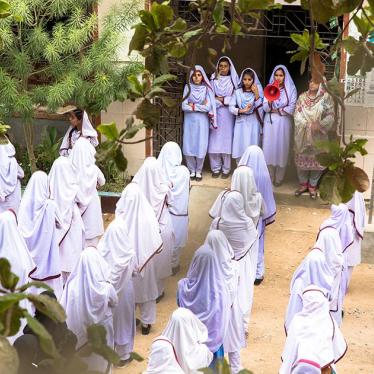(Washington, DC) – The United States should end the practice of sentencing people convicted of crimes committed before age 18 to life in prison without parole, Human Rights Watch said today in an amicus brief filed in a case before the Inter-American Commission on Human Rights.
The case, Henry Hill et al. vs. the United States of America, was brought by the American Civil Liberties Union and Columbia Law School’s Human Rights Institute on behalf of 32 people serving such sentences in Michigan for crimes they committed as children. The Inter-American Commission, a principal organ of the Organization of American States tasked with overseeing the human rights obligations of member countries, will hear arguments in Hill on March 25, 2014. In its brief, Human Rights Watch notes that the US should also address an underlying problem: the US practice of prosecuting children as adults, also known as “adultification.”
“The United States is alone in the world in its widespread use of life-without-parole sentences for children, and these sentences are a direct consequence of its practice of prosecuting children as adults,” said Alba Morales, US criminal justice researcher at Human Rights Watch. “Henry Hill and his fellow petitioners were each sentenced to life in prison without parole after Michigan allowed prosecutors to charge them as adults, with no consideration of their status as children.”
Every state in the US allows for children to be charged as adults in some circumstances. In Michigan, as in many states, the trend has been toward making it easier to move children into the adult system. By transferring children to adult court and subjecting them to adult procedures, detention and incarceration in adult facilities, and adult sentences, the United States violates international norms and treaties that require special treatment for children under 18.
In the amicus brief, Human Rights Watch argues that by continuing to prosecute children as adults and by sentencing children to life without parole, the US, including the state of Michigan, is violating its obligations under the Charter of the Organization of American States and the American Declaration of the Rights and Duties of Man, which the US signed in 1977.
The United States has not ratified the American Convention on Human Rights, the main human rights instrument in the Inter-American system. Nonetheless, the declaration requires countries to provide children with special measures of protection, recognizing that their incarceration should only be used as a last resort and for the shortest duration, and that children are entitled to a proportionate sentence, to rehabilitation, and to be free from discrimination, among other rights.
Human Rights Watch also noted that the Hill case underscores a question left open by the US Supreme Court’s recent decisions on life-without-parole sentences for children. In Graham v. Florida, the court struck down life-without-parole sentences for juveniles convicted of crimes other than homicide, but it did not address such sentences in homicide cases. In Miller v. Alabama, the court determined that the mandatory imposition of life-without-parole sentences for juveniles, regardless of the crime, violates the US Constitution. However, it failed to address the non-mandatory imposition of such sentences, and left open the question of what remedies were available to those who were already serving such sentences.
In the wake of Graham and Miller, thousands of people in the United States are still serving these sentences for crimes they committed as children, including the petitioners in the Hill case, either because they were sentenced for homicide cases, they were given these sentences even though they were not mandatory, or the states that imposed their sentences contend that the Miller decision is not retroactive.
The question of what to do about people already serving such sentences continues to vex US states, which are addressing it in various ways. The California legislature, for example, established a process that gives people serving such sentences a meaningful opportunity to obtain parole. On the other hand, Pennsylvania courts have denied people who had already been sentenced to juvenile life without parole the right to challenge those sentences. The question of whether Miller is retroactive is pending before the Michigan Supreme Court.
“US Supreme Court rulings have brought US laws closer in line with human rights standards, which recognize that children are both less culpable than adults and uniquely capable of rehabilitation,” Morales said. “It’s now time for the US to correct the ongoing injustice by ensuring that Henry Hill and his fellow petitioners do not die in prison for crimes they committed when they were still children.”






